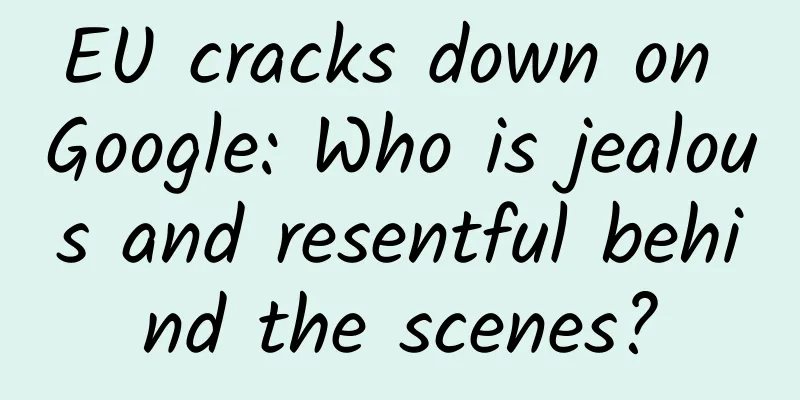EU cracks down on Google: Who is jealous and resentful behind the scenes?

|
I thought the EU's proposal to split Google's search business was just a symbolic gesture, but I didn't expect the European Parliament to actually vote in favor of splitting Google's search business. Although it was aimed at the entire search market, not just Google, and it didn't mention Google's name, Google occupies almost 90% of the business in the European search market, so the implication is that it must be Google. Although this proposal has no legal effect, it still has a certain degree of authority and deterrence for the EU antitrust organization. This is probably why Google is also worried that the European Parliament will agree to split the search business. It is reported that the European Parliament voted in favor of the motion to split Google, hoping that the EU antitrust agency will take more stringent measures against Google and other Internet search engines, including splitting the search business. The European Parliament recommends that the European Commission consider this resolution to split the search engine's search business from other businesses. However, the Computer and Communications Industry Association (CCIA, whose members include Google, eBay, Facebook, Microsoft and Samsung, etc.) said that the split is an "extreme and difficult to implement" solution that is not reasonable in the rapidly developing online market. There is actually a story behind the European Parliament's targeting of Google. It turns out that Google's competitors in the United States have been secretly working hard. Some media disclosed that "it is precisely because of complaints from American competitors such as Microsoft, Expedia and TripAdvisor that the EU launched an antitrust investigation against Google, and it has lasted for four years." "American companies regard the European Commission as a battlefield. They come to complain about Google. They tell us that Google's concessions are not enough." It is reported that Microsoft and other companies have long been aware of the huge power of the European Commission. Compared with the US antitrust agency, the EU antitrust agency is more aggressive. For example, the investigation into Google has lasted for four years. As early as May this year, the European Union's highest court ruled that users can delete their names or related historical events from search engine results pages, the so-called "right to be forgotten." According to the ruling, users can ask search engines to hide specific items in search results. In addition, Google is also facing challenges in copyright. In fact, whether it is split or not cannot completely change its position in the search market. Google's advantage in this field is too obvious. The only regret is that there is no company in the European Union that can compete with Google in this regard. In addition, their own value orientations are very similar, so Google's development in the European Union is almost unimpeded, which naturally accelerates its pace of development. Unlike some markets, it is subject to certain controls and entry barriers. The reason why Microsoft and other competitors are so serious about Google is because of Google's strength in the Internet era, including entering the mobile Internet market. Google has also gained many opportunities with the expansion advantages of Android itself. On the surface, Google has not directly intervened in the most famous mobile terminal market in the mobile Internet market. After all, Google has not gained any market performance opportunities in the mobile phone market. It once acquired Motorola Mobility, but eventually sold it to Lenovo, China, because Google's original intention was not in the smartphone market. Although it has cooperated with HTC and launched some OEM products, Google has not shown a certain determination in either the smartphone or tablet market. In terms of wearable devices, Google Glass is also a standout. This is another competition in application scenarios, and Google still shows strong strength. However, for the smartphone market, Apple's dominance, Samsung's global expansion, and the rise of Chinese local mobile phone manufacturers are all closely related to Google. After all, Android's open source expansibility is too strong. When Alibaba's Aliyun OS was launched, Acer cooperated with it to carry out mobile layout. Google stopped it in time after learning about it, which is to protect its absolute position in the market. Although there is no direct comparison with Apple's iOS, the competition between the two in the market has never stopped. In terms of device startup applications, Android's advantage is still very obvious, because too many third-party manufacturers use Android's system support. This is also where Google can do more in the future. Because in terms of intellectual property accumulation, Google's advantages are difficult to match by other independent mobile manufacturers. Of course, there is no problem with the current authorized use, but what about after expanding to a large enough market? On the surface, the European Parliament's "impeachment" of Google is aimed at the search market. In fact, Google has a huge influence on the entire Internet market. But can a split solve the problem? A vote without legal constraints cannot bring any results. Although it will bring certain pressure to antitrust agencies, it may end in vain, or Google may make concessions in some areas. The key to the problem is to find competitors and put real pressure on them. As a winner of Toutiao's Qingyun Plan and Baijiahao's Bai+ Plan, the 2019 Baidu Digital Author of the Year, the Baijiahao's Most Popular Author in the Technology Field, the 2019 Sogou Technology and Culture Author, and the 2021 Baijiahao Quarterly Influential Creator, he has won many awards, including the 2013 Sohu Best Industry Media Person, the 2015 China New Media Entrepreneurship Competition Beijing Third Place, the 2015 Guangmang Experience Award, the 2015 China New Media Entrepreneurship Competition Finals Third Place, and the 2018 Baidu Dynamic Annual Powerful Celebrity. |
<<: As a continuity technology, what problems can 5G solve?
>>: How does cloud computing do government business?
Recommend
Revealing the secrets of why Casarte, the dark horse of high-end home appliances, has grown rapidly against the trend?
Data shows that since the first half of 2015, man...
Python tutorial "Python Zero Basics 30 Days Speed Pass" Basic Tutorial for Beginners
Training course video lecture content introductio...
How do Internet finance platforms retain users?
Although new media operations cannot effectively ...
A few "eggs" actually facilitated the "return to one's roots" across billions of years?
Recently, "National Science Review" pub...
Are these 9.9 yuan free shipping headphones really usable? Will they damage your hearing?
On many shopping apps, when you search for "...
Alipay releases Apple phone security tips: Apple users beware of fraudulent payment
[[245706]] Alipay's official Weibo account re...
IDC: The scale of the artificial intelligence market reached US$2.18 billion in the first half of 2021, a year-on-year increase of 42.2%
IDC China released the AI market share report f...
How painful is gout? "It feels like someone is hitting my bones with a hammer"
How painful is gout? Some people describe it like...
Why is there no notification after my official account is linked to the mini program?
Q: Why is there no notification after my official...
Two U.S. tech rising stars suffered setbacks, and smart hardware startups turned cold
When GoPro went public, it said that it had alrea...
Talking about Programmers Series: Oh, I am a ghost problem!
Programmers (software development engineers) have...
The increase is far greater than the price of gold. Maybe one day we will have to say goodbye to chocolate... | Expo Daily
The increase far exceeds the price of gold. Maybe...
Beware! 4 people were poisoned! Just because they drank this soup...
Recently, the Panyu District Market Supervision B...
Attention, friends who ride electric bicycles! This "cold-proof magic weapon" is very dangerous →
As winter approaches, the weather is getting cold...
Will Apple's iPhone fall behind in the 5G era? Self-developed, Intel is unreliable, Samsung and Qualcomm refuse to sell
There is no doubt that 5G mobile phones will be l...









